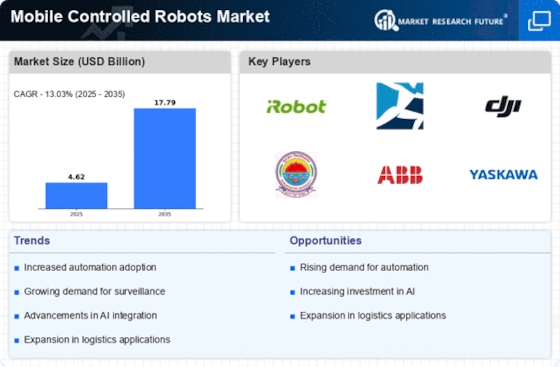Top Industry Leaders in the Mobile Controlled Robots Market

The Competitive Landscape of the Mobile Controlled Robots Market
The mobile controlled robots (MCR) market is a labyrinth of innovation, competition, and diverse applications. Understanding the strategies employed by market leaders, the factors influencing market share, the emergence of new players, and the overall competitive scenario is crucial for navigating this dynamic landscape. The MCR market is a complex and exciting space brimming with competition, innovation, and opportunities. Players who successfully embrace cutting-edge technologies, cater to high-growth applications, navigate the evolving regulatory landscape, and adapt to changing customer needs are poised to capitalize on the immense potential of this rapidly evolving market.
Key Player:
- KUKA AG
- Lockheed Martin
- Google, Inc.
- Bluefin Robotics Corporation
- Adept Technology, Inc.
- GeckoSystems Intl. Corp.
- Northrop Grumman Corporation
- ECA Group
- Honda Motor Co., Ltd.
Strategies Adopted by Leaders:
- Technology Focus: Companies like iRobot and ABB Robotics prioritize advanced navigation systems, sensor fusion, and AI-powered decision-making capabilities to ensure robot autonomy and efficiency.
- Vertical Specialization: Boston Dynamics focuses on humanoid robots for complex tasks in logistics and disaster response, while Teradyne deploys robots for automated testing and inspection in manufacturing, showcasing the value of specialization.
- Software and App Development: Intuitive mobile apps and cloud-based control platforms like those offered by SoftBank Robotics enhance user experience and remote operation, adding value to robot offerings.
- Partnerships and Acquisitions: Established players like Yaskawa and FANUC collaborate with startups and research institutions to access cutting-edge technologies and expand their product portfolios.
- Cost-Effectiveness Play: Chinese manufacturers like Siasun and Elephant Robotics offer lower-cost robots for basic tasks in logistics and warehousing, catering to budget-conscious customers.
Factors for Market Share Analysis:
- Technological Advancements: Companies with superior navigation systems, AI algorithms, and sensor fusion capabilities command premium pricing and secure market share through increased robot autonomy and efficiency.
- Application Focus: Catering to high-growth applications like autonomous delivery, warehouse automation, and remote inspection in hazardous environments offers significant market potential.
- Regional Demand and Regulations: Adapting to regional regulations and safety standards, particularly for outdoor robots, is crucial for market access and growth.
- Investment Potential: Companies with strong R&D capabilities and proven ability to attract venture capital or public funding are better positioned to fuel technological advancements and secure market share.
- After-Sales Service and Support: Reliable maintenance and repair services build customer trust and brand loyalty, particularly in critical applications.
New and Emerging Companies:
- Startups like Agility Robotics and ANYbotics: These innovators push the boundaries of robot mobility and dexterity, focusing on applications like disaster response and search-and-rescue.
- Academia and Research Labs: Universities like MIT and Carnegie Mellon University conduct research on advanced robot control algorithms and human-robot interaction, laying the groundwork for future market disruptions.
- Telecom and Tech Giants: Companies like Amazon and Google invest in developing robots for last-mile delivery and home automation, potentially shaping the future of consumer robotics.
Industry Developments:
Boston Dynamics:
- Dec 2023: Unveiled Spot Flex, a smaller and more agile version of its Spot robot, targeted for inspection and surveillance applications.
- Oct 2023: Announced partnership with Hyundai Motor Group to develop and commercialize logistics robots.
ABB Robotics:
- Dec 2023: Launched IRB 6700, a collaborative robot designed for close interaction with humans in assembly and packaging tasks.
- Sep 2023: Acquired ASTI Mobile Robotics, expanding its portfolio of autonomous mobile robots (AMRs) for logistics applications.









